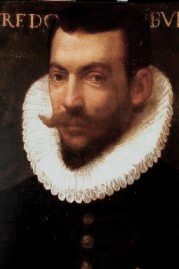Excerpt from the essay Tarot in Literature I
Translation revised by Michael S. Howard, Feb. 2012
For the occasion of research that aims to particularize the word Tarot in great Renaissance literary texts, after La Cassaria by Ariosto we come to the Dialogues of Tasso. Two of these are very important, both because the author cites the tarot, and also for understanding his feelings towards the game, fortune, love and other matters that he delineates with almost philosophical characteristics (An extensive discusion of this work is in an essay in Italian) (1).

Tasso was a great player and lover of tarot, so much so that he considered the game as an art: we are informed in one of his letters, of September 16th 1575, sent to “The very Magnificent Mr. Luca Scalabrino” in Rome. Writing about theatrical machines and other wonders, he concludes his letter in this way: “So this admirable and wonderful [thing] suits every part of the epic poem, in which, however, that which treats of errors is necessary, on which I will write another time, since now I’m tired and I want to play tarot, an art in which for me is more success than the poetic one” (2).
Tasso wrote the two dialogues about the game with one year between them: Il Romeo, o‘ vero del Giuoco (The Romeo, or about the game), composed during his first year of imprisonment, appeared in the Parte prima delle Rime del signor Torquato Tasso, insieme con altri componimenti del medesimo (First part of the Rhymes of Signor Torquato Tasso, together with other compositions by of the same)(Venice, Aldo Manuzio, 1580) while Il Gonzaga Secondo, o ‘ vero del Giuoco, dialogo del signor Torquato Tasso (The Second Gonzaga, or the Game, dialogue of Signor Torquato Tasso) was published separately in 1582 (Venice, Bernardo Giunti and brothers).
This second one, which is configured as a correction (it could be defined in this way) of the Romeo, was written by Tasso in Saint Anna Hospital in Ferrara in 1581, that is to say, one year after writing the Romeo, and it then was printed the next year. To these two dialogues we have dedicated a specific essay in the Italian version of the web site. For this English version we report the Matter of the Romeo and the passages in which the word “tarot” appears, and also the “Tarochi” version, which clearly show the attraction of Tasso for this game.
Matter of the Romeo, or about the Game
At Carnival 1579 Count Annibale Romei, Ferrara Cavalier, and lover of every kind of game, but very acculturated and full of style, talked very much about the game, in the presence of Margherita Gonzaga, recently married to Alfonso II Este, and of the two princesses of Ferrara, Lucrezia and Eleonora. So the author pretends that Annibale Pocaterra, a young man studying philosophy, who had listened to that reasoning, finding himself in conversation with lady Margherita Bentivogli, talks to her of the games and to the degree that she asks, he explains the basic points of the discourse he heard. This is The Romeo, the summary of that conversation. It deals first with the pleasure obtaining from one game or another. And it deals also with chess, of its origin, and the study it requires: passing then to examine the word "Game", it can be seen that it has a double meaning, and it means not just victory and winning money or something strictly connected to money, but also the imitation of real things such as tournaments, assaults, and so on. Leaving aside this second way of games, we define the first, saying that it is a ingenious fight for fortune among two or more people, done for pleasure or entertainment of the soul, in which the last thing is money or measured by money. This definition is explained by showing how the player has to be honoured and has to be allowed to know clearly, in this kind of game, the role played by fortune and that played by ingenuity. Finally we talk about that mix of hope and fear that the player feels; and the conversation ends with some considerations about the sweetness of winning” (3).
The Romeo, or about the Game
Speakers: Annibale Pocaterra and Margherita Bentivoglia
M. B. Don’t you play?
A. P. I’m more able to turn Socratic cards then these ones: sometimes I do play primero; but I like some others. And in this company since there was no place for me to play primero I preferred looking instead for a pleasant and challenging game of Trappolla or Sbaraglino with someone.
M. B. You would have found company for Tarot.
A. P. I would not refuse to play such a game.
.......
.......
M. B. Let’s set aside this second way, since it is proper to theatres, and talk about the other, much used at home; sometimes in public, and it seems to me that it is an imitation of the first. So not only chess represents war, but also the ball [pallo] or tarot [tarochi] and many other games of this kind, of which some seem to be a kind of imitation. We women make some other little games in our private rooms, and according to me the first are different from the second.
Etc.
Notes
1 - Please, see in Italian the essay Il Tasso e i Tarocchi.
2 - The letter appeared in the volume Unpublished Letters by Torquato Tasso, taken from Manuscripts by Marc’Antonio Foppa conserved by Abbey P. A. Serassi in the Casa Falconieri in Rome (Pisa, 1827).
3 - Cesare Guasti, Dialogues by Tasso, Vol. II, Florence, 1858, page. 3.
Copyright by Andrea Vitali - © All rights reserved 2006